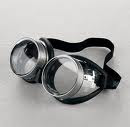Geeks: I love geeks! Consider, for example, the 2002 findings from Scotland academics:
ß = (An)2 x d(S + 1)
√L x (Vo)2
where:
- An is the number of servings of alcohol
- S is the smokiness of the area on a scale of 0 – 10
- L is the lighting level of the area, measured in candelas per square meter, in which 150 is normal room lightning
- Vo is Snellen visual acuity, in which 6/6 is normal and 6/12 is the lower limit at which someone is able to drive
- d is the distance between the observer and the observed, measured in meters [source: BBC News]
The formula works out a “beer goggle” score ranging from 1 to 100+. When ø = 1, the observer is perceiving the same degree of beauty he or she would perceive in a sober state. At 100+, everybody in the room is a perfect 10.
I, too, yearn to deconstruct my desires, sentiments and choices so neatly. For example, I know that my standards in food considerably deteriorate (or shall I just say “change” to stay all copasetic?) when I’ve just done a spin class…when the options at a certain hour are few…so perhaps I could even assign a relative weighting to X watts exerted, contending with a constraint of Y miles in available edible options and Z minutes of time elapsed since aforesaid watts were exerted….
But would all of this knowledge really change my behavior? I think it would just make the goggles that much more transparent. And transparency often leads to accountability, which typically aspires to some sort of behavior change.
*Behavior change.* Guess I’ll be keepin’ those goggles on. With my eyes wide open, of course.

